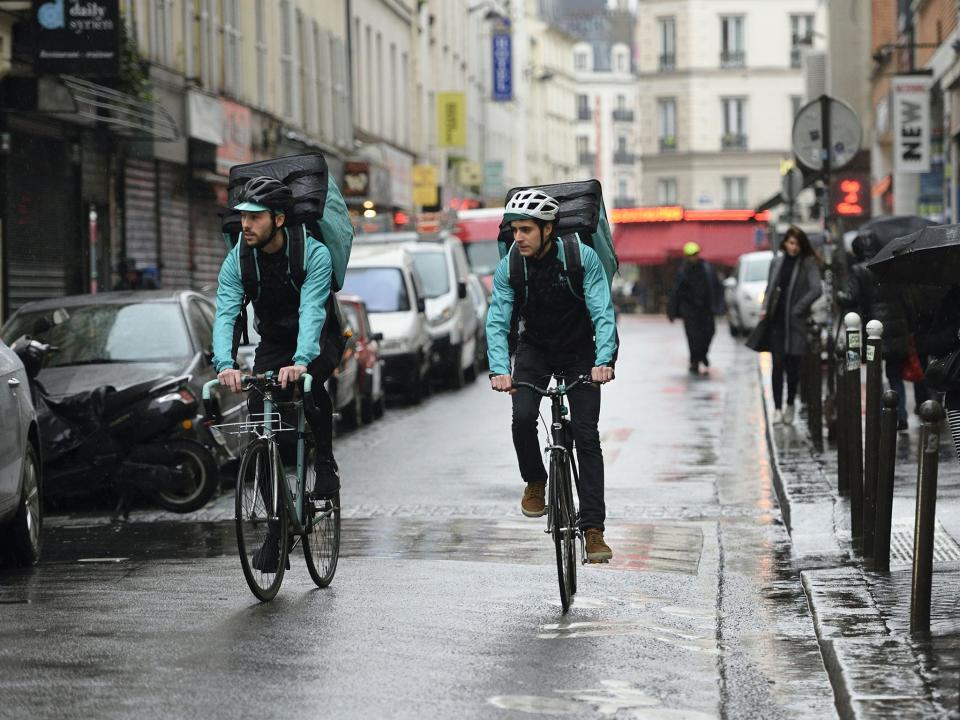The gig economy breaks people. Our victory over CitySprint is a win for all exploited workers in the sector

I was grabbing lunch when I heard that we’d won. Before I knew it I was sobbing big tears into my tomato soup. For years, myself and some fellow union members at the Independent Workers Union of Great Britain (IWGB) have been battling it out with my former employer, the courier company CitySprint. To finally win worker status and basic employment rights is an enormous relief after years of bullying and exploitation. Working in the gig economy breaks people. It was such a relief because defeat would have been so crushing.
Companies like CitySprint have a lot to answer for. It’s not just about living without the basic rights others take for granted, like minimum wage, holiday pay, pensions; things we all need, work hard for and deserve. It’s about what it does to a person to have to ask for these scraps and be ignored, year in, year out. It’s about what that does to your mental health, your self-esteem, your whole life. Eventually I decided I had to fight back.
When I started there as a courier I thought CitySprint would be different. In most courier companies you get ID numbers like prisoners but CitySprint let us choose our own nicknames. I went from being P18 to being Peter Pan. Before long though I realised CitySprint was no better than the rest of them. It claims to be one of London’s leading courier services, transporting everything from human organs for transplants to paperwork for multi-million pound business deals. But like all gig economy companies, it expected us to perform like workers, while denying us all the rights that should go along with that.
Bullying and harassment by controllers was an everyday endurance test. They’d call me first thing even on days I’d booked off, demanding to know what I was doing and pressuring me back to work. When controllers communicate with couriers on the radio, everyone can hear what the controller says but only the controller can hear you, so when they humiliate you in front of your colleagues, if you have anything to say in your defense no one even hears it. Ultimately, the controller allocates jobs so they hold all the cards. I had a colleague who bought him a coffee every day to make sure he got work.
When I asked other couriers how I could earn more jobs, they told me to go to the pub with the controllers. I get intense social anxiety so that scene is my worst nightmare. I don’t think in a million years they’d think about fairness or accessibility for people like me or those who don’t drink. Getting drunk with the guy who’s bullied you all week shouldn’t be a precondition for making ends meet but it felt like it. Since we were all misclassified as independent contractors, they wouldn’t even have to fire you, you get paid per job so they could just starve you out. You’d never even know for sure what happened, let alone be able to prove it.
The campaign was how I found my courage. When CitySprint refused to enter into dialogue with the union, we used flash mob protests to get the attention of clients, many of whom were London Living Wage accredited and didn’t realise they were outsourcing to a delivery company that didn’t even pay the minimum wage in some cases.
Protests were small at first but everyone there was really valued. The solidarity from other workers across the union who joined our protests really kept us going, especially the cleaners from across London who were engaged in their own fights against outsourcing and exploitation. Despite the natural isolation of delivery work, we felt part of a community. After a few months, we won a 17 per cent pay rise, the first we had seen in a decade.
After CitySprint’s first defeat in court by the IWGB in 2017, it just changed our contracts rather than comply with the ruling. It was devious and dishonest but if I wanted to keep my job I had no choice but to sign. Our victory last week has broken new ground because it shows companies can’t just cover up the cracks by changing contracts without changing the reality on the ground. Unfortunately, winning and leaving CitySprint hasn’t meant leaving all this sort of thing behind. The truth is that the whole gig economy is rotten and if we want change, we all have to step up.
I’m quite a private person, not the type to stand up and give speeches, but being part of the union has helped me find my voice. I joined the IWGB in 2015 when the Couriers & Logistics Branch was established. I started going along to support workers from other sectors when they held actions and saw how much our fights all have in common: precarious workers, exploited and denied basic rights by multi-million pound corporations who’ve found a way to play the system. It really opened my eyes.
We still don’t know how much backdated holiday pay we’ll be awarded but for me it was never about the money, it wasn’t even just about CitySprint. It was about holding these gig economy companies to account. It’s a scandal that we had to drag them back to tribunal three times but it shows what even a small number of organised workers can achieve.
It also shows how determined CitySprint have been to deny us those rights and it took me a while to realise why, to see the full extent of what’s at stake here: it’s the future of the entire gig economy and the question of whether precarious workers will live on our knees. I won’t.
Phil Weber is a former CitySprint courier.

 Yahoo News
Yahoo News 